| Each January, the folks at the American Dialect Society vote for the Word of the Year.
The 2006 winner is: PLUTOED. To pluto is “to demote or devalue someone or something, as happened to the former planet Pluto when the General Assembly of the International Astronomical Union decided Pluto no longer met its definition of a planet”. See the full press release, including all other nominations and vote tallies, here. |

|
This Friday’s colloquium will be given by Justin Fisher from the Department of Philosophy, UBC. The title of his talk is “How Smart Languages Learn to Teach Themselves to Stupid Children” (abstract below).
The talk will be in the Buchanan Penthouse, starting at 3:30 pm (coffee and cookies at 3:15), on Friday, Jan 26th.
ABSTRACT
“This paper has two aims. One is to undercut the arguments that many people have taken to favor a popular nativist position in linguistics. The other is to present a strong alternative to Linguistic Nativism. I call this alternative Symbiotic Developmentalism, for, as I argue, I think we can profit by thinking of ‘language acquisition’ as involving the simultaneous development of two symbiotic ‘organisms’ – a language and a homo sapiens child. (A similar view is advocated by Terrance Deacon 1997.)
I begin by stating clearly what is held by Linguistic Nativists. I then carefully consider the various sorts of evidence that have been mustered in favor of Linguistic Nativism. I argue that none of this evidence favors Linguistic Nativism over Symbiotic Developmentalism, while some of it does favor Symbiotic Developmentalism. In the concluding section, I argue that Symbiotic Developmentalism may open promising new avenues for linguistic research, avenues which are not readily available within a nativist framework.”
The Winter 2007 schedule for the Faculty of Arts Student Workshop series is out. Sessions include:
Getting Started at the UBC Library
If you’re new to UBC or just wanting a refresher, come join us for an overview of the UBC Library and our web sites. Learn about the resources & services available to you, whether you’re in the library, at the office, or doing research from home. This introductory class includes an orientation to the Catalogue, ejournals, indexes, subject guides, and the chat reference service AskAway
Google Scholar and More: All Articles All the Time!
You know that lots of journals and magazines are published on the web. But where? This workshop will show you where to look — whether you’re starting with a bibliography, an author’s name, a topic, or just an idea.
RefWorks is a web-based citation management tool, sponsored by the UBC Library, and available free-of-charge to current UBC faculty, staff, and students.
In this hands-on workshop you will create your own personal database in RefWorks, learn how to add references, and use these references when writing a paper, automatically formatting your footnotes and bibliography in the citation style of your choice.
Register online for any of these free workshops at the UBC Library Instruction Calendar. (Click the session you want to attend to get to the registration form.)
Sponsored by UBC Library, and supported in part by funding from the office of the Dean of Arts.
Did you know that you can borrow laptops from the library? These laptops allow you to download software, so that if you need to use special language fonts such as IPA phonetic fonts or other language-related software, a loaner laptop will do the trick. (Campus and library computer labs generally don’t allow you to download onto workstations.)
The loan period is 4 hours, and they’re available at the Koerner, Woodward, David Lam, and Robson Square branch circulation desks. You can even check the library catalogue for availability! Just do a title search for “laptop computer“.
For more information, see the Loaner Laptops FAQs.
A final language (and Christmas!) related posting for 2006:

The Telegraph newspaper is reporting on an acoustic analysis of the Queen’s Christmas broadcasts to the Commonwealth since 1952 which shows that over the years, the Queen’s English has become less posh. The article begins: “As the common tongue continues its inexorable slide towards a new dark age of glottal stops and “innits”, news comes that even the Queen is drifting slowly down river towards Estuary English.”
Between 1952 and 2006, the royal vowel sounds have slowly shifted from the upper class Upper Received Pronunciation towards the more democratic Standard Received Pronunciation.
“In 1952 she would have been heard referring to ‘thet men in the bleck het’. Now it would be ‘that man in the black hat’. Similarly, she would have spoken of the citay and dutay, rather than citee and dutee, and hame rather than home In the 1950s she would have been lorst, but by the 1970s lost.”
The original research paper by Jonathan Harrington, published in the Journal of Phonetics Vol. 34, Issue 4, Oct. 2006, is called An acoustic analysis of ‘happy-tensing’ in the Queen’s Christmas broadcasts.
UBC Library subscribes to the Journal of Phonetics online – read the full article here. You can also listen for yourself by viewing the Queen’s Christmas broadcasts in these short video clips from 1958, 1975, and 2006.
According to an online survey by dictionary publisher Merriam-Webster, the word that best summed up 2006 is: truthiness – “truth that comes from the gut, not books.
Truthiness made its debut on Comedy Central’s The Colbert Report in October 2005.
This is not the first award for the word – it was also awarded the 16th annual Word of the Year (2005) by the American Dialect Society, who defined it as “the quality of preferring concepts or facts one wishes to be true, rather than concepts or facts known to be true.”
UBC Library is currently trialling the database Lexicons of Early Modern English.
Lexicons of Early Modern English (LEME) is a historical database of monolingual, bilingual, and polyglot dictionaries, lexical encyclopedias, hard-word glossaries, spelling lists, and lexically-valuable treatises surviving in print or manuscript from the Tudor, Stuart, Caroline, Commonwealth, and Restoration periods (1480-1702).
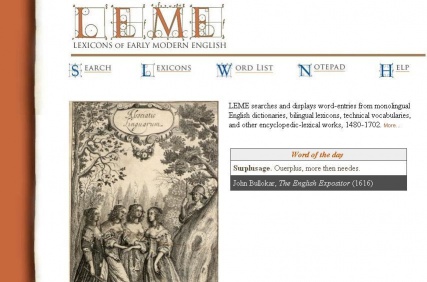
A sample of titles from the over 150 lexicons:
The trial ends January 10, 2007.
Need a place to study for exams, with research materials and computers at hand?
Koerner Library is open for extended hours during the exam period. The library will be open every night until 1 am from December 4-18.
Good luck on your exams!
Looking for the International Encyclopedia of Linguistics? No need to come to the library – this book is now available online.*
The Encyclopedia encompasses the full range of topics in linguistics, including such areas as historical, comparative, formal, mathematical, functional, philosophical, and sociolinguistics.
To use the book, you can either Browse by scanning through a list of the entries in alphabetical order or Search for entries. In the left hand column, there is a list of related entries called See also, which is a list of entries related to the one you are currently looking at. Below this, you’ll see a list of Adjacent entries which can be used to browse through nearby entries (alphabetically) just as you might do with the print edition.
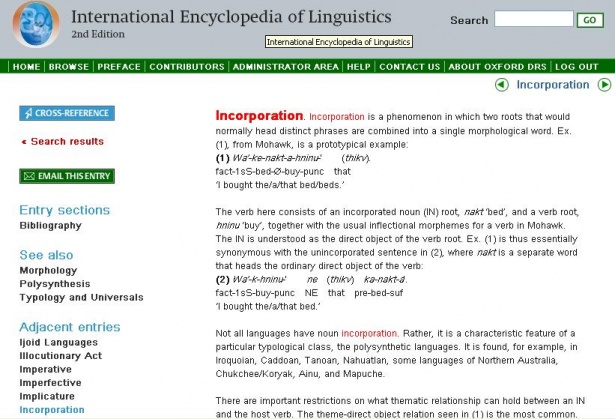
Another great feature of this collection is the “Cross Reference” tool. Highlight a word or phrase and then click the blue “Cross Reference” button to search across the entire encyclopedia for that word or words.
Illustrated material includes colour images of brain functioning, tree diagrams of both linguistic structure and language families, and diagrams of theoretical models.
One of the lovely things about online resources is the ability to link to related works. In this ebook, the bibliography at the end of each entry provides a link to the UBC Library catalogue for each citation. Simply click the “Find’ icon to search the catalogue for the book.
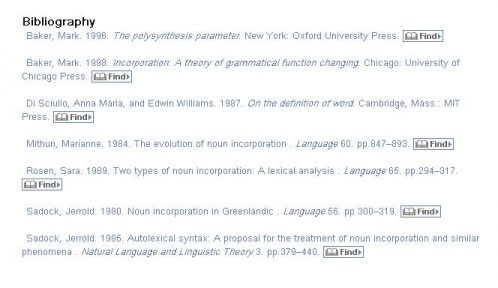
Enjoy! As always, please let me know if you have any questions or comments about this resource.
———-
* If you’d prefer the print book version of the International Encyclopedia of Linguistics, we have the four-volume set in the Reference section of Koerner Library (on the second floor), at call number P29 .I58 2003.
For finding information on a specific language or languages in a specific region of the world, the Linguist List Languages database is an excellent starting point. The database allows you to search for a language information in a number of different ways: by language; by language family name; by Ethnologue code; and geographically, using an interactive world map.
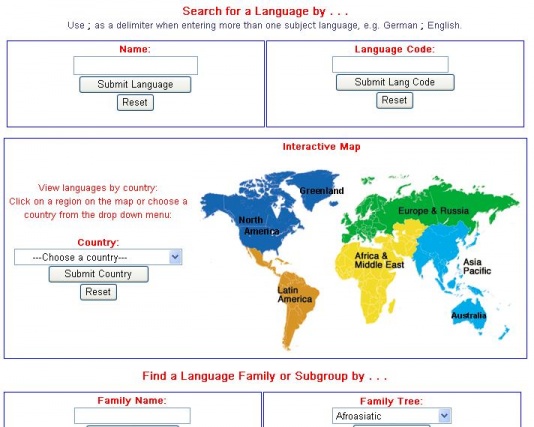
Once you’ve found the language you’re interested, the results show basic information about the langage (Alternate and Dialect Names; Countries Spoken in; Status as a living or extinct language; Language Family), plus links to language-specific information on other linguistics sites such as Ethnologue, ODIN Database (Online Database of Interlinear Text), and the Rosetta Project, as well as all the resources related to the language in the LINGUIST-list database, like this:
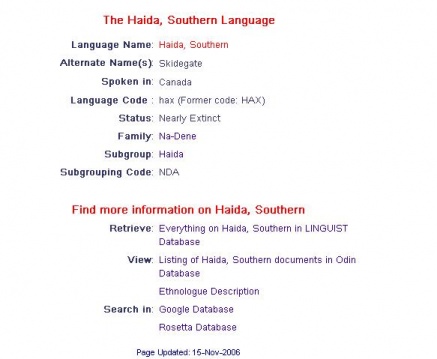
Another one of the neat features of the database is that it also keeps track of languages which have become extinct or are in imminent danger of becoming extinct and provides a handy browse list of names, with links to the database for more information on each language.
Search This Blog
- Assignments
- At the Library
- Computational Linguistics
- Corpus Linguistics
- Diversions
- Electronic Resources
- In the News
- Journals
- Lexicography
- LING Courses
- Linguistics Department
- New Books
- Open Access
- Phonetics
- Publishing
- Syntax
- Tips and Tricks
- Uncategorized
- What's New?
- Workshops and Tutorials
- Writing Systems
